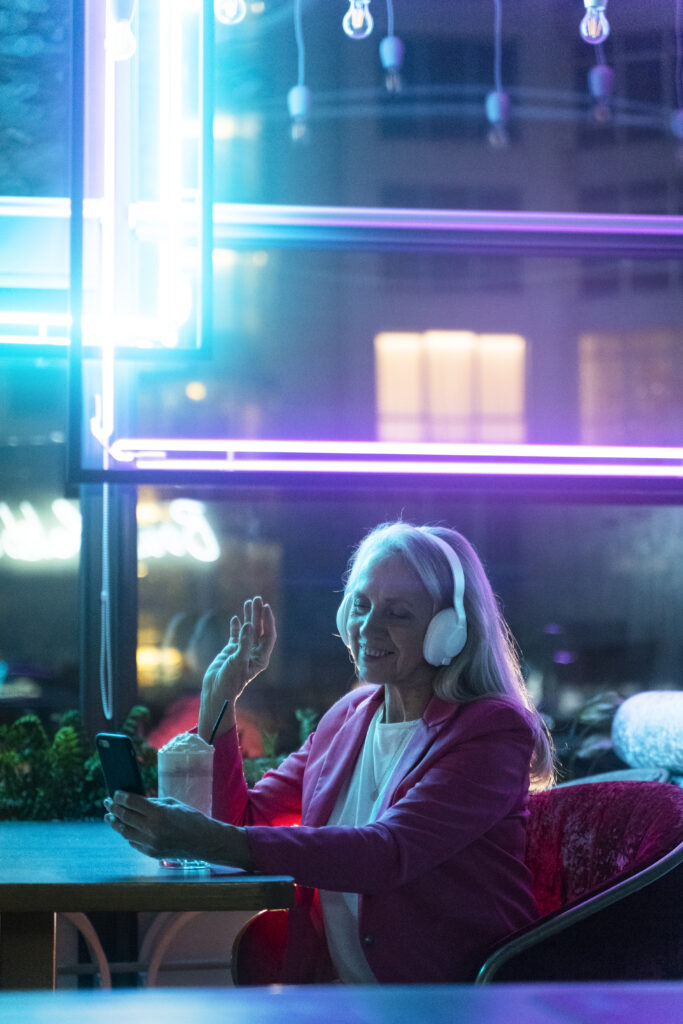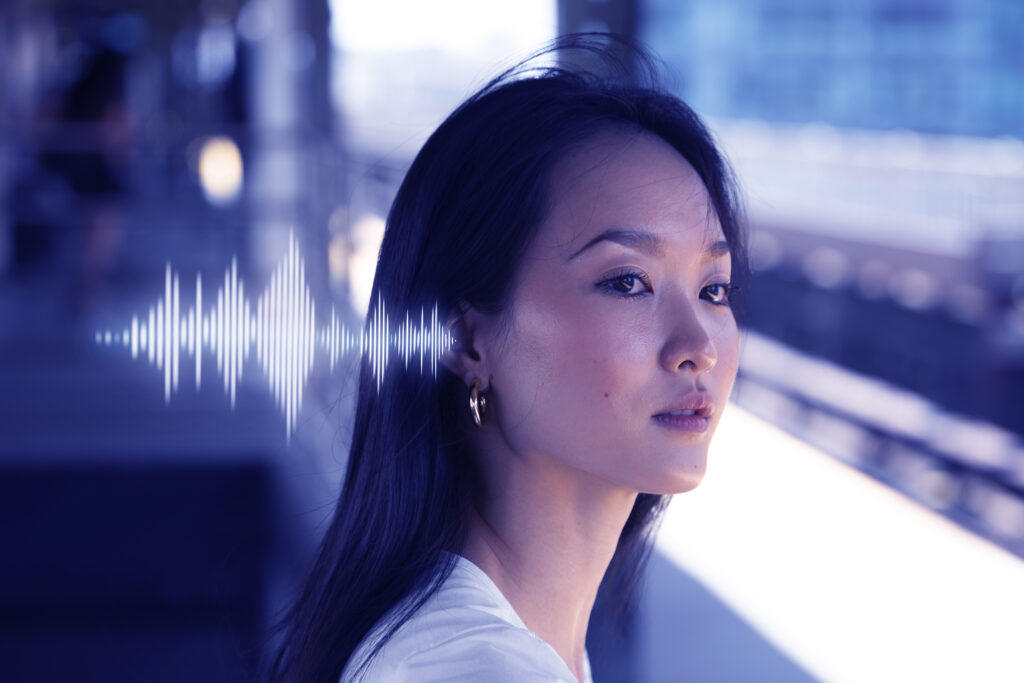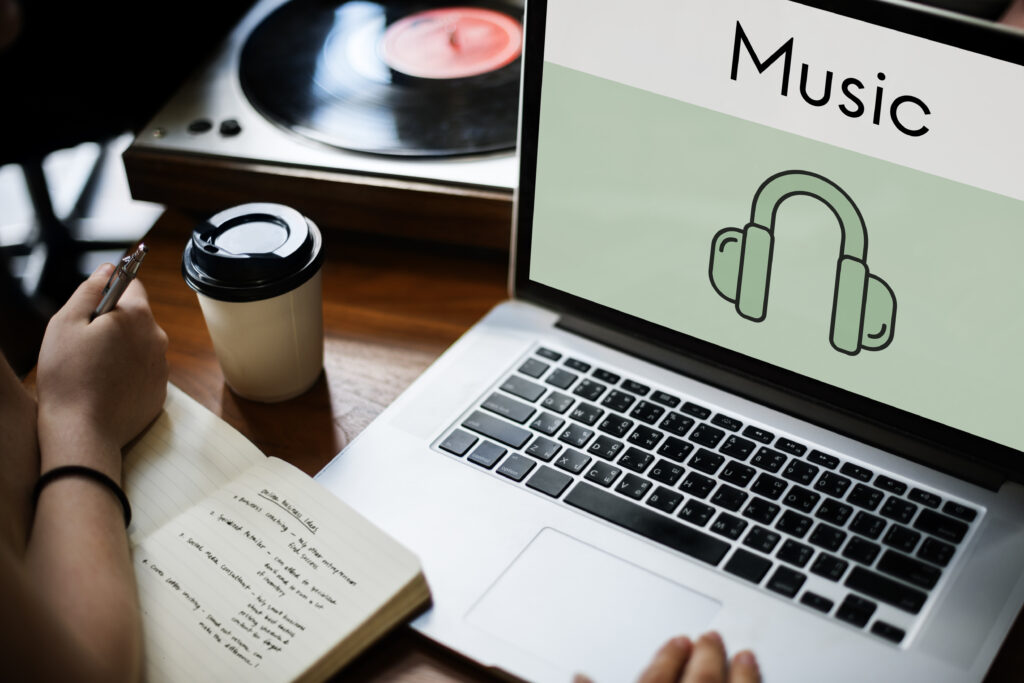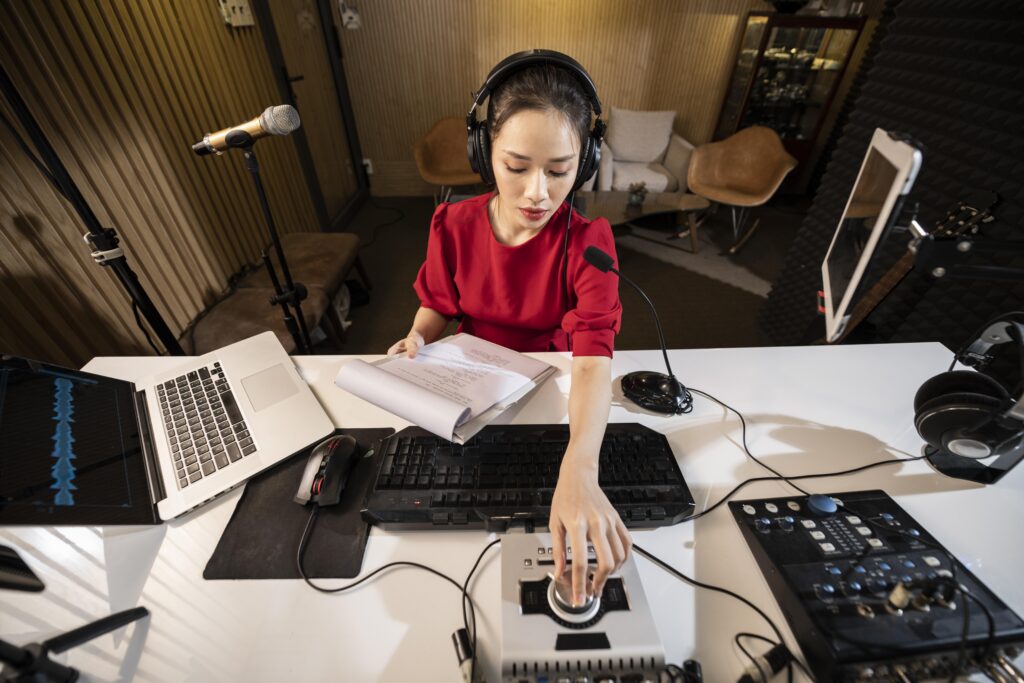AI Revolution in Music Composition
In music composition, the advent of artificial intelligence marks a paradigm shift, offering tools that can complement and even redefine the creative processes of composers and musicians.
These sophisticated algorithms can dissect vast arrays of historical musical data, extract complex patterns, and generate novel compositions that challenge traditional boundaries.
Integrating AI into music can democratize the art form, enabling those with minimal formal training to craft pieces that resonate with the richness of seasoned artists.
As we stand on the cusp of this technological renaissance, it is imperative to consider both the artistic and ethical ramifications; the potential for AI to serve as a muse is profound, yet its role in attributing originality and copyright remains a contentious issue.
The question looms: as we embrace the capabilities of AI, how will the essence of human creativity fare in this new symphony of man and machine?
Key Takeaways
- AI in music composition utilizes computational algorithms, rule-based systems, statistical models, neural networks, and evolutionary algorithms to create complex musical structures.
- AI in music education offers personalized learning paths based on data-driven insights, allowing learners to experiment with composition and production without extensive formal training.
- AI streamlines the music production process, provides creative enhancement and detailed analysis tools, and integrates AI features into digital audio workstations.
- Collaborative compositions between AI and artists inspire new motifs, harmonies, and rhythms and lead to innovative explorations across various musical genres.
The Genesis of AI-Composed Music

The advent of AI-composed music can be traced back to pioneering computational algorithms that laid the foundation for machines to understand and create complex musical structures. AI-based music creation has evolved significantly, leveraging rule-based systems, which encode music theories into algorithms, and statistical models that predict note sequences. The sophistication of neural networks, capable of learning from vast datasets of existing music, has particularly accelerated the potential for AI in music creation. Furthermore, evolutionary algorithms mimic the process of natural selection to improve musical compositions iteratively.
AI-generated music emerges from the digital synthesis of these methodologies. AI can analyze components of music, extracting key facets such as tempo, key signature, and harmonic progressions. This analytical capacity informs the AI’s subsequent synthesis of new compositions, ensuring coherence and adherence to stylistic nuances. Projects like Google’s Magenta, OpenAI’s Jukebox, and Sony’s Flow Machines exemplify the innovative strides in music composition, where AI replicates and pushes the boundaries of human creativity.
As AI continues to permeate the domain of music, it presents a dual-edged sword—ushering in unprecedented innovation and democratization while simultaneously stirring ethical debates surrounding authorship and the future role of human musicians within the industry.
Machine Learning Meets Melody

At the intersection of machine learning and music, sophisticated algorithms can now compose melodies that resonate with the complexity and nuance of human-crafted compositions. These AI music systems, employing various approaches from neural networks to evolutionary algorithms, generate new music and provide musical creation tools for artists.
Machine learning can deconstruct and understand music at a granular level, enabling the generation of melodic ideas that are both original and contextually relevant. This is achieved by analyzing vast datasets of existing music to identify patterns and structures that can be emulated or innovated upon.
The following table outlines key aspects of AI’s role in generating melodies:
| Aspect | Description | Benefit |
|---|---|---|
| Pattern Recognition | AI identifies common melodic structures. | Enables the creation of familiar yet novel melodies. |
| Harmonic Analysis | AI deconstructs harmony to complement melodies. | Ensures musical coherence and richness. |
| Style Continuation | AI continues the styles of past composers. | Preserves musical heritage with fresh compositions. |
| Creative Block Aid | AI proposes melodic variations. | Assists composers in overcoming creative hurdles. |
| Experimentation | AI allows rapid prototyping of ideas. | Encourages innovative musical explorations. |
In this analytical and technical milieu, machine learning catalyzes innovation, fostering new forms of expression within the musical domain.
AI’s Role in Music Education

AI’s incursion into music education marks a transformative era where personalized learning paths are crafted through data-driven insights, tailoring instruction to each student’s needs and pace.
This technology facilitates augmented creative exploration, enabling learners to experiment with composition and production in previously inaccessible ways without extensive formal training.
Moreover, AI’s capacity to streamline practice sessions through intelligent feedback mechanisms can significantly enhance the efficiency and effectiveness of skill acquisition.
Personalized Learning Paths
Harnessing the power of artificial intelligence, educators are now crafting personalized learning paths that adapt to the individual musical journey of each student. AI for music education is not just innovative; it is a transformative force enabling the creation of custom learning experiences. Personalized music education driven by AI analyzes students’ skill levels, preferences, and progress, offering music tailored to their growth and interests.
| AI Features | Benefits to Students | Impact on Music Education |
|---|---|---|
| Skill Level Analysis | Focused Improvement Areas | Targeted Teaching Methods |
| Preference Recognition | Engagement in Learning | Diverse Musical Exposure |
| Adaptive Learning Pace | Reduced Frustration | Efficient Progress Tracking |
| Individualized Feedback | Personalized Guidance | Enhanced Learning Outcomes |
| Exploration of Genres | Broadened Musical Horizons | Cultivation of Versatility |
This analytical approach ensures that learning paths are personalized and highly effective in nurturing musical talents.
Augmented Creative Exploration
While traditional music education relies on human expertise to guide creative exploration, AI is now stepping in to augment this process, offering tools to generate innovative compositions and inspire new musical directions.
AI music creation tools harness rule-based systems, statistical models, neural networks, and evolutionary algorithms to produce original works, transforming the creative process by introducing vast possibilities for creativity and innovation. These technologies enable musicians to explore new musical styles by analyzing and extrapolating from existing music data—key, tempo, chords, melody, harmony, and structure—thereby enriching the production process with creative suggestions.
Furthermore, AI’s generative capabilities democratize music creation, empowering a broader demographic to compose and disseminate their musical expressions.
Efficiency in Practice Sessions
AI also offers significant advancements in music education, building on the augmented creative exploration in music composition. This is particularly evident in its ability to enhance the efficiency of practice sessions through personalized guidance and real-time feedback.
- Personalized Tutorials: AI tools provide bespoke tutorials, enabling musicians to tailor their skill development to their specific needs. This optimization of learning outcomes is achieved by addressing individual weaknesses and focusing on areas that require improvement.
- Error Correction: AI-assisted music creation tools can identify and correct mistakes in real time during practice. This ensures musicians have productive and focused practice sessions, as they receive immediate feedback on their performance.
- Audio Analysis and Suggestions: AI can analyze audio and suggest technical improvements. This feature helps musicians overcome creative blocks and refine their sound by providing insights and suggestions for enhancing their compositions.
- Collaborative Learning: Intelligent systems foster cooperative learning environments. This allows musicians to engage in shared practice sessions, benefiting from their peers’ collective knowledge and experience. With the help of AI, these collaborative sessions can also be leveraged for joint musical innovation.
The Impact on Music Production

Artificial intelligence significantly streamlines the music production process, providing tools for creative enhancement and detailed analysis of musical components. By integrating AI features into digital audio workstations (DAWs), artists and producers can leverage algorithms that generate music, suggest chord progressions, and even simulate virtual instruments. This expedites the creative process and opens up new sound design and composition possibilities.
The intersection of AI and music production has its challenges. Ensuring AI-generated music remains innovative and avoids clichés requires ongoing development. Additionally, the ability of AI to interpret and express the nuanced emotions that human composers imbue in their work is still an area of active research and development.
Here is a snapshot of AI’s dualistic impact on music production:
| Opportunities | Challenges |
|---|---|
| Enhanced creative workflow | Originality and innovation |
| Global artistic collaboration | Emotional and expressive depth |
| Advanced sound design | Copyright and intellectual property |
Collaborative Compositions: AI and Artists

Exploring beyond the streamlined production process, the collaboration between AI and human artists is forging new frontiers in music composition. This symbiosis is not just about efficiency but also about enhancing human creativity with the computational power of artificial intelligence. The result is an evolving landscape of collaborative compositions that meld human emotional depth with AI’s vast data processing capabilities, leading to innovative explorations across various musical genres.
Here is a numerical list that encapsulates the relationship between AI and artists in creating original music:
- Idea Generation: AI’s ability to process and analyze vast amounts of data from different musical genres can inspire artists with new motifs, harmonies, and rhythms.
- Creative Expansion: Human artists leverage AI tools to explore uncharted territories in music composition, pushing the boundaries of their creative output.
- Iterative Refinement: AI can help fine-tune melodies and arrangements through an iterative process, allowing artists to refine their compositions with precision.
- Cross-genre Innovation: AI systems can merge elements from diverse musical genres, facilitating the creation of original music that transcends traditional categorizations.
As AI and artists continue to collaborate, the potential for groundbreaking musical innovations is vast, redefining the art of composition in the digital age.
Algorithms in Songwriting Processes
Algorithms have become indispensable in modern songwriting, serving as creative algorithmic collaborators that augment the human composition process.
Techniques for melody generation, utilizing advanced statistical models and neural networks, enable the synthesis of unique and complex musical sequences.
This fusion of technology and artistry accelerates the production timeline and introduces a level of innovation previously unattainable in traditional songwriting methods.
Creative Algorithmic Collaborators
Delving into songwriting, AI serves as a dynamic partner capable of transforming the traditional composition process through its algorithmic prowess and innovative contributions. Generative AI systems are now essential creative tools, ushering in a new era of artistic expression where the lines between human and machine creativity blur.
These systems enhance the songwriting process by:
- Generating Original Compositions: Utilizing neural networks and evolutionary algorithms to craft unique musical pieces.
- Musical Analysis: Extracting key musical elements from existing compositions to inform new works.
- Creative Suggestions: Offering innovative harmonic, melodic, and rhythmic ideas during composition.
- Collaborative Innovation: Allowing artists to explore uncharted musical territories, pushing the boundaries of conventional music-making.
The synergy between AI and musicians is redefining the landscape of musical compositions.
Melody Generation Techniques
Building on the collaboration between AI and artists, melody generation techniques stand at the forefront of algorithmic songwriting processes, offering a spectrum of approaches for creating novel musical lines. These techniques use generative AI to analyze vast datasets to develop innovative and coherent music. Variational autoencoders, for instance, are instrumental in generating melodies that are not mere replications but are novel in their composition. OpenAI’s MuseNet is a cutting-edge example, demonstrating a complex understanding of style and creativity in melody generation.
| Technique | Description | Example Project |
|---|---|---|
| Rule-Based Systems | Uses predefined musical rules to generate melodies. | – |
| Statistical Models | Employs probabilistic methods based on music data analysis. | Google’s Magenta |
| Neural Networks | Leverages deep learning to predict and generate sequences of musical notes. | OpenAI’s MuseNet |
| Evolutionary Algorithms | Applies principles of natural selection to evolve music compositions. | Sony’s Flow Machines |
| AI Analysis | Extracts music elements to inform the creation of variations and mashups. | Spotify’s Music Intelligence |
AI-Driven Music Analysis Techniques
Harnessing the power of artificial intelligence, music analysis techniques have advanced to the point where they can deconstruct complex compositions, offering insights into music’s underlying patterns and structures. The music industry now uses AI to analyze large music datasets to understand and predict trends and inform the development of generated music. These AI-driven techniques leverage the vast computational capabilities of modern technology to dissect and comprehend music at a granular level, often surpassing the speed and accuracy of human analysis.
Here are four pivotal AI-driven music analysis techniques:
- Extraction of Musical Attributes: AI algorithms can identify and catalog various musical components such as key, tempo, chords, and melody, enabling a deeper understanding of a piece’s composition.
- Creation of Derivative Works: Utilizing the extracted data, AI can craft variations, remixes, or mashups, potentially offering new creative perspectives.
- Collaborative Platforms: AI-powered platforms connect artists globally, facilitating collaboration and potentially leading to innovative cross-cultural creations.
- Reinforcement Learning Applications: AI systems can use reinforcement learning to improve analysis, continuously refining their understanding of music theory and composition nuances.
These techniques represent the cutting edge of how AI innovates within the music industry, reshaping how we create, interpret, and experience music.
Ethical Implications of AI Composers
Integrating AI into music composition necessitates a rigorous analysis of authorship and copyright issues, particularly as AI-generated works challenge traditional notions of intellectual property.
The advent of AI composers also prompts a critical evaluation of their impact on professional musicians, potentially disrupting job markets and redefining skill requirements within the industry.
Moreover, discerning the line between technological innovation and creative authenticity becomes increasingly complex, raising questions about the value and originality of AI-generated compositions in cultural discourse.
Authorship and Copyright Issues
As artificial intelligence ventures into music composition, it brings complex issues concerning authorship and copyright that challenge traditional legal frameworks and ethical norms to the forefront.
- Ownership Determination: AI-generated compositions blur the lines of ownership, questioning whether new musical works are attributable to the AI, the programmer, or both.
- Intellectual Property Rights: AI’s ability to create variations of pre-existing works can lead to accidental copyright infringement, necessitating more precise guidelines.
- Authenticity and Creativity: The role of AI in music composition sparks debates about the authenticity of art and the value of human creativity.
- Regulatory Evolution: There is an urgent need for regulatory bodies to evolve, ensuring music composers using AI navigate authorship and copyright issues responsibly and innovatively.
AI Impact on Musicians
With the advent of AI in music composition, ethical implications surface as musicians navigate the changing landscape of creativity and employment within the industry.
Generative AI’s capacity to produce music through sophisticated algorithms challenges traditional notions of authorship. Musicians embarking on a music project may now leverage the power of AI to create new melodies and harmonies, effectively reshaping the creative process.
However, this innovative tool questions human artists’ future roles and employment opportunities. As AI systems become more adept at crafting complex compositions, the industry must critically evaluate the ethical boundaries of AI’s role in music production and consider the implications for those who have dedicated their lives to the art of music.
Creative Authenticity Concerns
Moving beyond the practical impacts on musicians, the rise of AI composers brings to the fore pressing concerns regarding the authenticity of creative outputs in an industry historically rooted in human emotion and experience.
- The essence of human creativity may be diluted when AI systems generate music that lacks the emotional depth and personal experience characteristic of human compositions.
- Ethical questions arise in evaluating the quality and originality of AI-generated music against the backdrop of traditional human artistic benchmarks.
- Creative authenticity concerns spotlight the blurring lines of authorship and the need for revised copyright laws to address the unique challenges posed by AI.
- AI necessitates responsible guidelines to prevent the perpetuation of biases and ensure the ethical integration of technology in the creative process.
The Future of AI-Enhanced Performances
How will AI-enhanced performances reshape the concert experience for audiences and performers in the coming years?
AI research is steering us toward a paradigm shift in live events, where the future of music lies in integrating AI’s capabilities with human talent. Innovations in AI are not only expected to augment the creative process but also to revolutionize the delivery of music to audiences.
Concerts may soon feature AI-powered systems that analyze crowd reactions in real-time, allowing performers to customize music dynamically, creating a more interactive and personalized experience. The utilization of AI in performances can offer new tools for artists, such as holographic instruments or virtual reality environments, thereby expanding the boundaries of the concert-going experience.
Moreover, the impact of AI on the music industry extends to the curation of performances, where algorithms could assist in setlist selection to maximize audience engagement based on streaming data and listener preferences.
As AI continues to mature, we can anticipate a seamless blend of technology and artistry that will redefine the essence of live music, ensuring that each performance is as unique as the audience it captivates.
Navigating the AI Music Landscape
As AI-enhanced performances continue redefining the concert experience, it is essential to explore how artificial intelligence transforms the broader musical landscape, particularly in composition and production. Integrating AI into music-making is not just about automating tasks; it’s about augmenting the creative process and opening up new avenues for musical expression.
Navigating the AI music landscape involves understanding several core functionalities:
- Generative AI: Leveraging neural networks and algorithms to create original compositions that push the boundaries of traditional musical structures.
- Analytical Tools: Utilizing AI to dissect and understand complex musical compositions, thus aiding in creating new lyrics and melodies that resonate with audiences.
- Sound Design: AI systems that craft unique sounds, which can be particularly valuable in electronic music and film scoring, where distinctive audio signatures are coveted.
- Production Assistance: AI as a collaborator in the studio, providing suggestions for harmony, rhythm, and texture that enhance the overall sound palette.
Through the analytical and technical lens, it’s evident that AI in music is not just a tool but a transformative force. It innovates by sculpting soundscapes and engendering a new creative partnership between humans and machines.
FAQs
What is the role of AI in music composition?
AI plays a significant role in music composition by providing tools and algorithms that assist musicians in generating melodies, harmonies, and entire compositions. It can analyze patterns, create unique styles, and contribute to the creative process.
How does AI contribute to the creative process in music composition?
AI contributes to the creative process by offering inspiration, generating musical ideas, and exploring diverse styles. It allows musicians to experiment with new sounds, harmonies, and structures, expanding the creative possibilities in music composition.
What types of AI technologies are commonly used in music composition?
Standard AI technologies in music composition include Generative Adversarial Networks (GANs), Recurrent neural networks (RNNs), and neural networks designed for sequence generation. These models can learn from existing music datasets and generate original compositions.
Can AI compose music in different genres and styles?
Yes, AI can compose music in various genres and styles. Depending on the training data and the model architecture, AI systems can emulate specific genres, mimic the styles of famous composers, or even create entirely novel and avant-garde compositions.
Is AI limited to generating melodies, or can it compose entire musical pieces?
AI is not limited to generating melodies; it can compose entire musical pieces. Advanced AI models, particularly those based on GANs and RNNs, can produce full compositions, including songs, harmonies, rhythms, and arrangements.
